Home » Posts tagged 'In Polish'
Tag Archives: In Polish
Stefan Pawlicki on Greek Concepts of Human Soul
On March 15th-16th 2025 the first conference of the Academic Club for Ancient Philosophy (Koło Naukowe Filozofii Starożytnej) at the University of Warsaw took place. This academic event was organised by young enthusiasts of ancient thought and gathered scholars from various Polish universitites, and students interested generally in the topic of body and soul or in the subjects of individual papers, the list of which can be found here.
AΦR, naturally, was present at the conference. Tomasz Mróz delivered a paper titled Stefan Pawlicki on the concepts of soul in Greek philosophy. Pawlicki (1839-1916) was once in his career a professor of philosophy in Warsaw, but Mróz’s paper was focused on mature period of his career, when he was a respected professor in Cracow and the author of History of Greek Philosophy. Volume I of this book appeared in print in 1890 (front page on the right) and was the first Polish handbook for ancient philosophy, while the volume III, meant to be devoted to Aristotle, was not finished by the author.
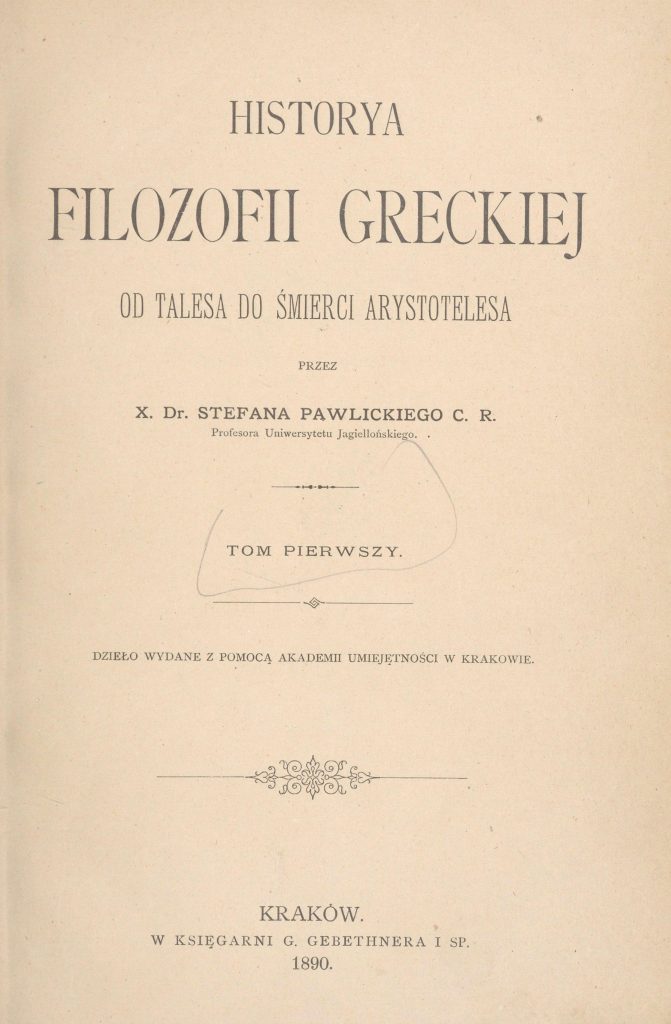
Pawlicki was an admirer of Plato, but instead of presenting well-known opinions of Pawlicki on Plato, Mróz discussed Pawlicki’s criticism of the pre-Socratic thinkers. Pawlicki was a historian of philosophy who aimed not only to provide the readers with an account of the ideas of Greek thinkers, but considered the needs of the Polish reading audiences and supplemented his discussion of the Greeks with assessments and evaluations presented from the Catholic standpoint.
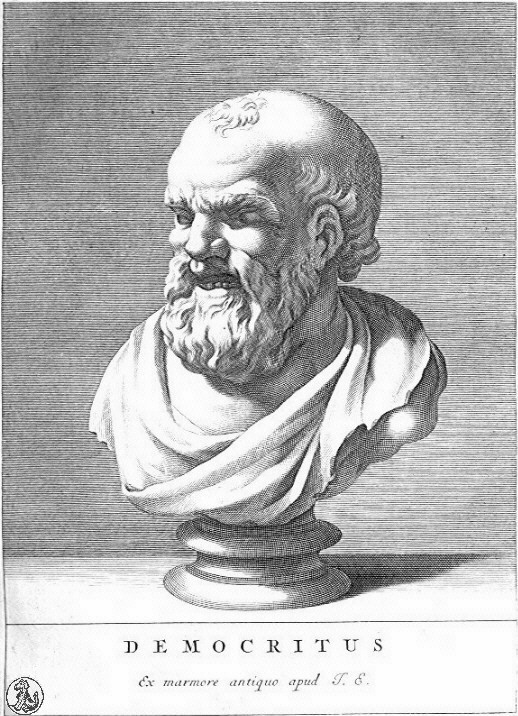
One of Pawlicki’s methods was to draw far reaching conclusions from the fragments of the pre-Socratic thinkers, especially materialist philosophers like Democritus, and then present them as unacceptable. For example, he stressed pantheist traces in Heraclitus and pessimism of Democritus, while at the same time he seemed to appreciate the concept of reincarnation and Pythagorean ethics, as encouraging human beings to improve themselves.
His arguments against most of the Greek concepts of human soul allow to structure them in order of perfection, starting with Aristotle (whom Pawlicki did not manage to present), followed by Plato and Socrates, with Pythagoreanism below, and ending with Heraclitus and Democritean materialism, which was – just like 19th century materialists – a constant subject of Pawlicki’s critical remarks.
Henryk Jakubanis and His Kyiv Years
Henryk Jakubanis (1879-1949), his life and intellectual legacy, have been in recent years the topic of research pursued by Mariam Sargsyan. In one of her papers, titled Henryka Jakubanisa (1879-1949) kijowski okres życia i twórczości historycznofilozoficznej (H. Jakubanis’ Kyiv Period of Life and Work in the History of Philosophy), she presented Jakubanis’ Kyiv years as fundamental and formative period of his intellectual biography. Her study has been published in Polish and can be downloaded here.
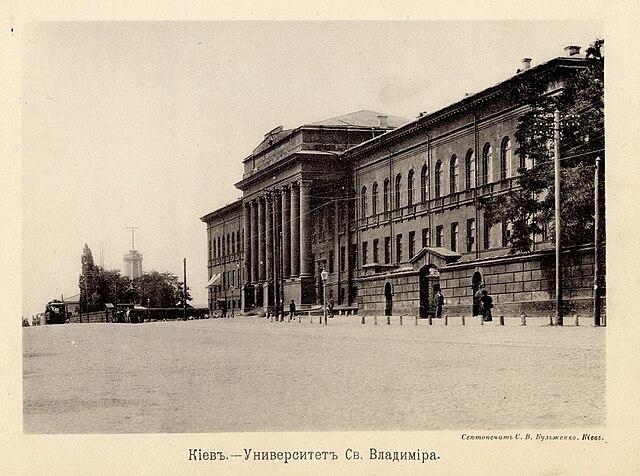
Kyiv period of Jakubanis’ life deserved a separate presentation, because our knowledge of his early career was far from satisfactory, not to mention some inaccurate or even false informations. M. Sargsyan was the first researcher who used Jakubanis’ documents from the University Library of the Catholic University of Lublin to such an extent, what was necessary to complete her task.
To present the life and academic activity of Jakubanis (on the right) in the Kyiv period in full, Sargsyan starts with his childhood and gymnasium education. Moreover, the history and philosophical traditions in the Saint Vladimir Imperial University of Kyiv are briefly sketched with an emphasis on Jakubanis’ study curriculum, the beginnings of his academic career and the personality of his supervisor, professor Alexei Gilarov. He was the professor who exerted the most significant impact on Jakubanis’ early works in the history of Greek philosophy.
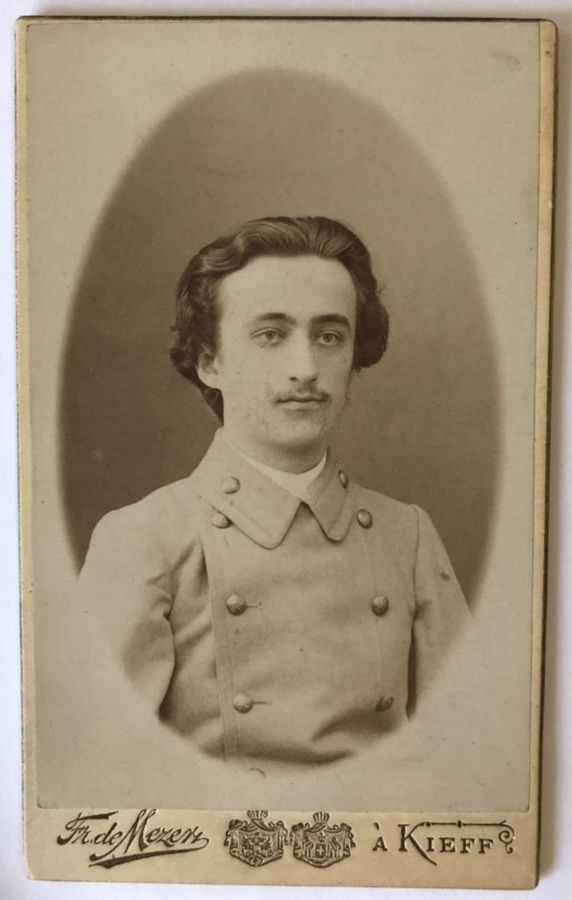
To conclude, it was in Kyiv where Jakubanis’ career as a teacher of classics and a researcher in the history of ancient philosophy started. Some of his achievements from this period are still of significance in the Russian-speaking world, for he is still remembered as the author of a work on Empedocles and one of the pioneers in translating fragments of this ancient thinker into Russian.
A Biographical Sketch on Henryk Jakubanis
Mariam Sargsyan, an AΦR researcher focusing on the legacy of H. Jakubanis, has recently published a paper Henryk Jakubanis (1879–1949) – a Historian of Greek Philosophy Between Kyiv and Lublin, which aims at discussing the entire academic path of this researcher of ancient philosophy, presenting his work in both periods of his life, connected to Kyiv and Lublin. The paper was published in Polish and can be downloaded here.
It is not insignificant to remark that Sargsyan’s paper has been published in an issue devoted to classical philology of “Roczniki Humanistyczne” (“Annals of Arts”, Vol. 72 No. 3, 2024, pp. 79-97), a journal edited at the Catholic University of Lublin (KUL), where Jakubanis used to work for over two decades of his life.
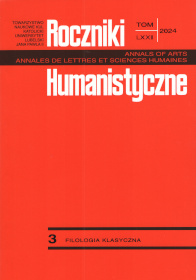
Jakubanis’ life began in the Russian Empire, and Sargsyan presents his family and his initial education it the gymnasium, with a focus on classical languages and humanities. Then the story proceeds to the Kyiv period of his life, including a brief sketch of the history of St Vladimir’s Imperial University of Kyiv and the researchers of the history of philosophy there, with an emphasis on Jakubanis’ academic supervisor, Alexei Gilarov (1856-1938). During his Kyiv period Jakubanis won a scholarship for a study visit in Germany, notably in Berlin, and was active as a university lecturer, teacher at various courses extra muros, and started to develop his academic and research career.
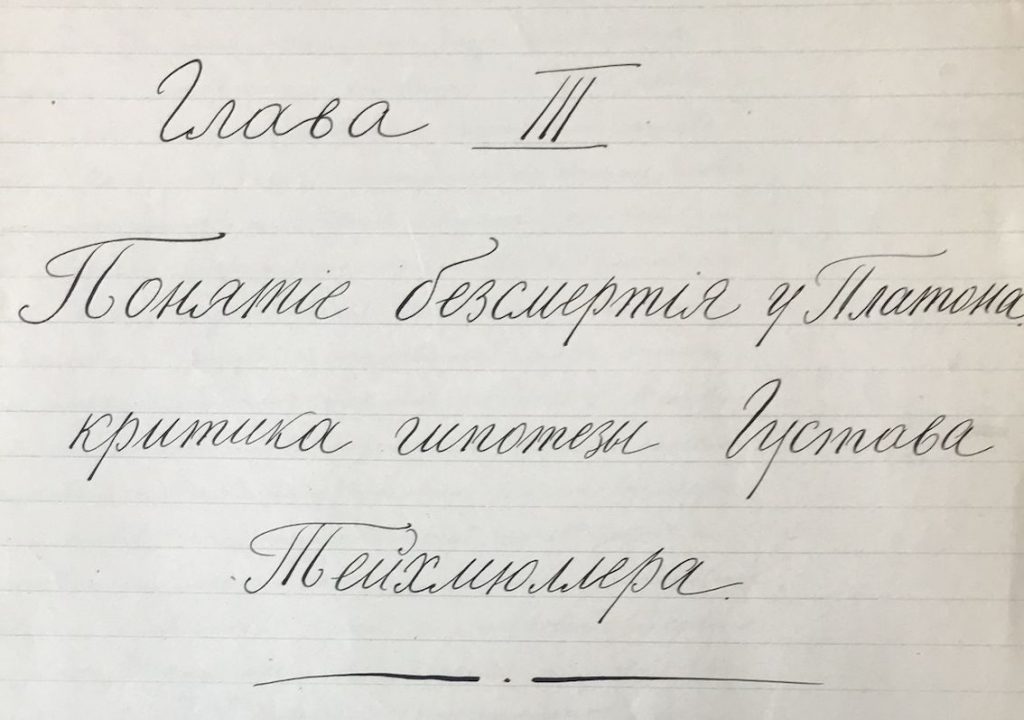
The Lublin period began in 1922 with Jakubanis’ repatriation from the then Soviet Ukraine to Lublin in the independent Republic of Poland. Thanks to the support of Tadeusz Zieliński (1859-1944), his former examiner in Kyiv, Jakubanis was hired at the University of Lublin. His lectures and seminars there, his life during the war, his works and impact are further discussed in the paper.
To sum up: Jakubanis spent 26 years of his life in Kyiv and 27 in Lublin where he died in 1949. These two periods were almost equal in terms of time, yet they were quite different. In Kyiv he composed most of his works and was formed as a researcher and teacher in classics in general and in the history of ancient philosophy in particular, while in Lublin he was rather occupied with university life and lecturing, and it did not allow him to focus on researching and publishing. For his entire life, however, he remained faithful to his interests in ancient philosophy and, according to his students, spared no energy to disseminate his knowledge and expierience in this field.
Platonism in Polish Romantic Poetry
On November 18th-19th an interdisciplinary conference took place in the Catholic University of Lublin (KUL), with the University of Warsaw (UW) as a coorganising institution. The title of the event was: The Romantic Tradition. Poetry, Community, Sources. Most of the papers presented during the meeting were focused on Polish poetry and literature of the 19th century Romanticism, nevertheless papers on various philosophical aspects of the epoch constituted a significant contribution to the conference topic.
A member of AΦR research group, Tomasz Mróz, took part in the conference and delivered a talk titled Plato in the Works of Słowacki. Some Observations. Mróz discussed references to Plato in the works by Juliusz Słowacki (1809-1849), a major figure in the period of Polish Romanticism, one of the three poets considered as the National Bards.
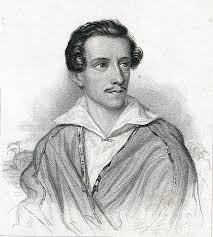
The speaker aimed to demonstrate that most of Słowacki’s references to Plato were incidental, that the poet mixed up Plato’s dialogues (the Phaedrus and the Phaedo) and his knowledge of Plato’s works was limited to their French translations or paraphrases. It was the idea of reincarnation that seemed appealing to Słowacki, but he could have learned it from other sources. The poet used and transformed, however, Plato’s myths and it was the myth of Er from the Republic that became the metaphysical foundation of Słowacki’s great poetic work The Spirit-King. The conclusion of the paper was that in spite of the fact that the name of Plato is present in Słowacki’s legacy, Platonism as a system of philosophical ideas is absent there.
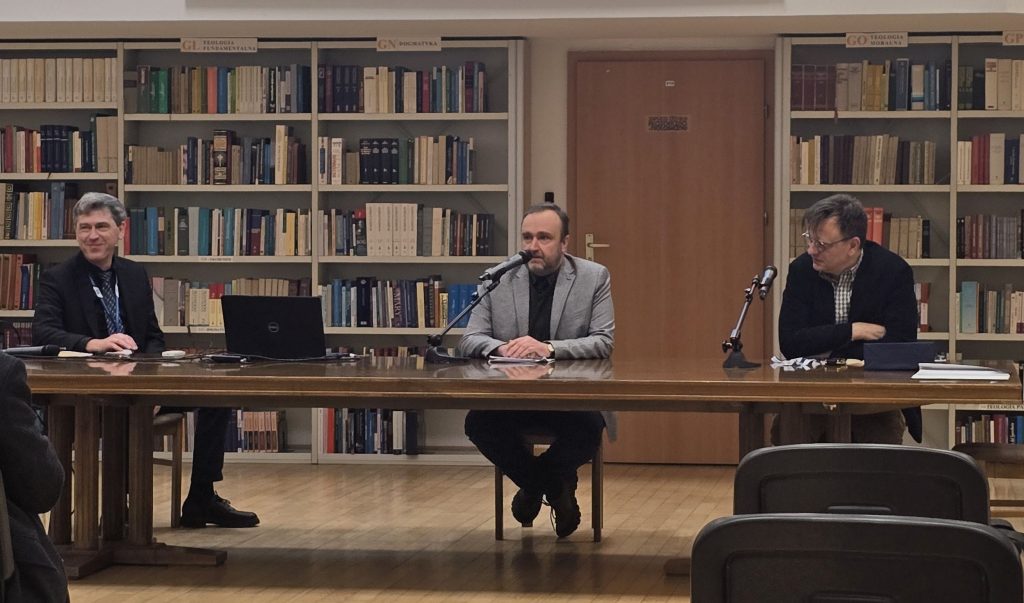
AΦR at the 3rd Congress on Polish Philosophy
The 3rd Congress on Polish Philosophy took place in October (18th-20th) in the Rydzyna Palace. It gathered scholars interested in researching the tradition of Polish philosophy and developing it. Two members of the Ancient Φilosophy Reception research group took part in this philosophical event: Adrian Habura – online, and Tomasz Mróz – onsite. The first of them spoke about the concept of love in the works of Władysław Tatarkiewicz (1886-1980), while the latter – on the history of studies on the reception of ancient philosophy in Poland.
Mróz’s paper was directly concerned with problems related to the reception of ancient philosophy and started with quotes of diverse opinions of two eminent Polish researchers in the history of Greek philosophy, that is, Stefan Pawlicki (1839-1916) and Wincenty Lutosławski (1863-1954). Lutosławski, when composing his works on Plato, searched for Polish authors and their studies to provide references to them, while Pawlicki paid no interest to the works of his compatriots on Greek philosophy.
In more recent decades it was Izydora Dąmbska (1904-1983), a philosopher and historian of philosophy, who published a study on the reception of Plato in Poland (1972), but nowadays many books and papers on this topic were published by the members of the AΦR research group. Concluding his talk Mróz briefly presented research projects of the members of the AΦR and the books they had published, to start with the latest one:
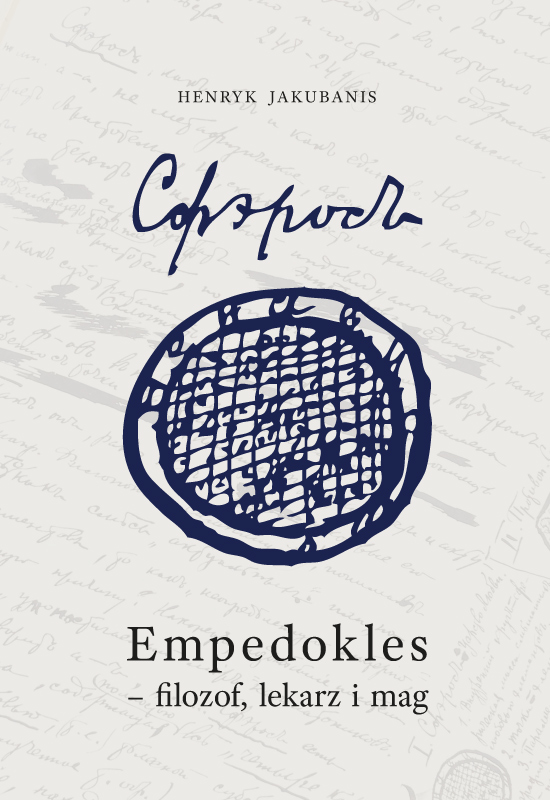
Henryk Jakubanis, Empedokles – filozof, lekarz i mag: Przyczynek do jego zrozumienia i oceny (Empedocles: a Philosopher, a Doctor and a Magus. Materials for Understanding and Assessing Him), transl. from Russian and ed. Mariam Sargsyan, A. Habura, Wydawnictwo Marek Derewiecki, Kęty 2024, 104 pp. (Studies and Texts in the History of Reception of Ancient Philosophy, vol. 3).
T. Mróz, Stanisław Lisiecki (1872-1960) i jego Platon (Stanisław Lisiecki (1872-1960) and His Plato), Wydawnictwo Marek Derewiecki, Kęty 2022, 150 pp. (Studies and Texts in the History of Reception of Ancient Philosophy, vol. 2).
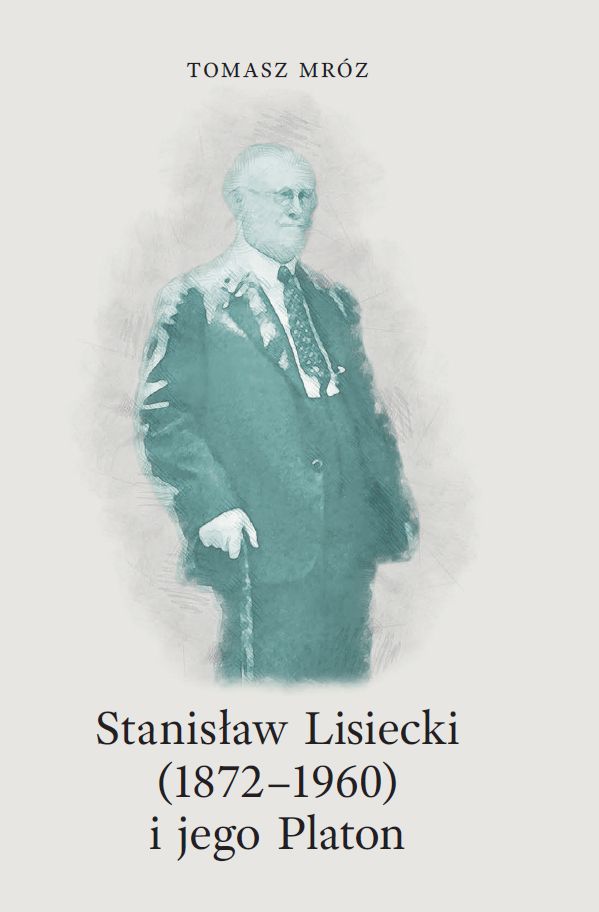
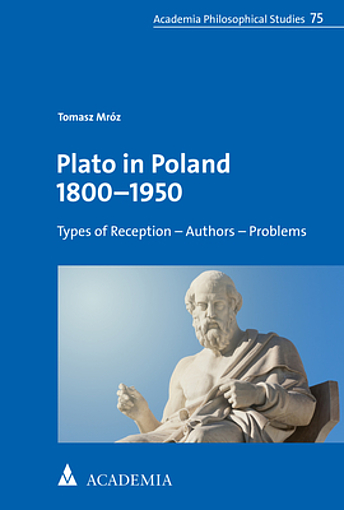
T. Mróz, Plato in Poland 1800-1950: Types of Reception – Authors – Problems, Academia Verlag / Nomos Verlagsgesellschaft, Baden Baden 2021, 480 pp. (Academia Philosophical Studies, vol. 75).
S. Lisiecki, O Platonie, Arystotelesie i o sobie samym (On Plato, Aristotle and on Himself), ed. T. Mróz, Wydawnictwo Marek Derewiecki, Kęty 2021, 367 pp. (Studies and Texts in the History of Reception of Ancient Philosophy, vol. 1).
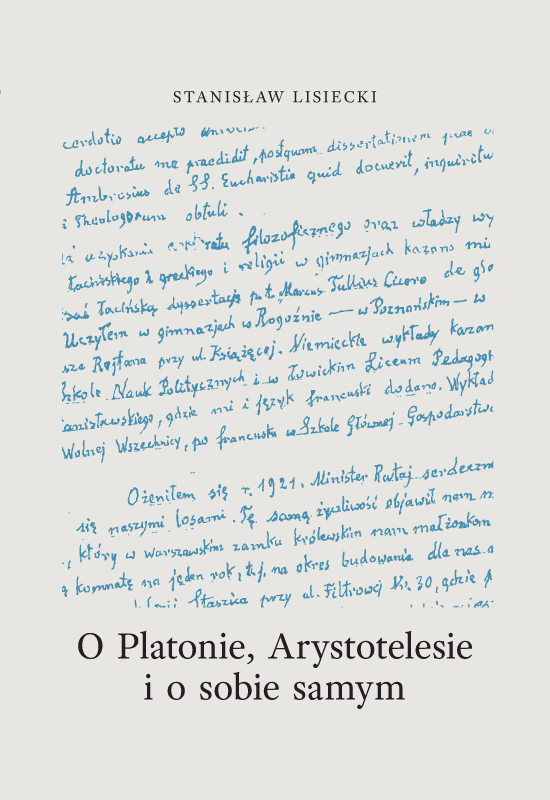
and some earlier ones…
Henryk Jakubanis and His Empedocles
Empedocles: a Philosopher, a Doctor and a Magus. Materials for Understanding and Assessing Him.
It was the title of the most important work by H. Jakubanis (1879-1949)
originally published in Kyiv in 1906.
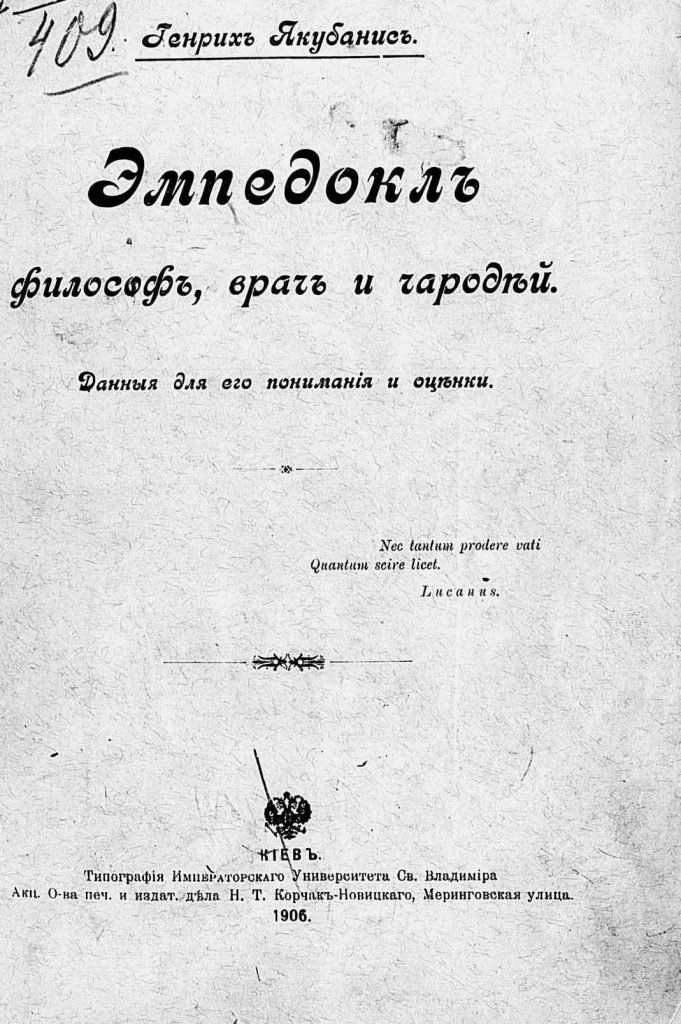
At the time of publishing this book the author was a young, 27 years old, lecturer and researcher at the St. Vladimir Imperial University of Kyiv. His area of competence and interest was established, it was ancient literature and philosophy with an emphasis on Greek philosophers. This volume consisted of two main parts: 1) Introductory presentation of Empedocles’ life, Sicilian society, culture etc., and finally – the sources of his philosophical thought. 2) Translations of the remaining fragments of Empedocles in verse and prose, with philological commentaries. It is the Jakubanis’ translation of the philosopher’s texts that won him recognition in the Russian-speaking world. Suffice to say that they are still in circulation today.
Jakubanis’s Empedocles had to wait for over a century to become finally available to Polish reading audiences. Until now this work had only been listed in bibliographies with no hint regarding its content. Two young Ph.D. students and researchers of AΦR group, Mariam Sargsyan and Adrian Habura, took their time to translate it from pre-reform Russian into well readable contemporary Polish. With their introduction the book was published as volume 3 of the book series published by Marek Derewiecki. Naturally, only Jakubanis’ own text was translated into Polish, for there was no need to re-translate his Russian renderings of Greek philosophical poetry. All the more so that Polish readers have a complete translation of Empedocles’ fragments by Katarzyna Kołakowska, a researcher from Jakubanis’ beloved Catholic University of Lublin.

It should only be added that the book is accompanied by an afterword by Kołakowska and it is available on the publisher’s website here.

This book is one of the results of the research project funded by National Science Centre on Henryk Jakubanis (1879-1949) as a classics scholar and historian of ancient philosophy.
Vitello’s Anthropology and Its Aristotelian Roots
On May 28th-29th 2024 a conference titled Polish Philosophical Anthropology took place in Częstochowa. This event was organised by the Department of Philosophy, Jan Dlugosz University. It was another conference held in Częstochowa that aimed at shedding some new light on selected aspects of the history of philosophy in Poland.
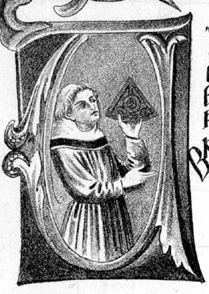
AΦR member, Tomasz Mróz, has participated in this conference with a paper devoted to the philosopher with whom all the histories of philosophy in Poland usually begin. It was Vitello, a 13th century scholar, who is well-known from his theory of demons as animals built from the four elements with air as a dominant factor. Vitello argued that the demons were superior physically and intellectually to all the other animals, including human beings. Human beings, consequently, could only be considered as an intermediary species between apes and demons. In this way Vitello, with the aid of Aristotle, demonstrated that human being can’t be regarded as a crowning creature in the terrestrial world. Let us add on the margin that Vitello took advantage of his expertise in philosophy, natural sciences, medicine and life’s experience to depict vividly various interactions between humans and demons, not all of which can be presented to the minors

Recent commentaries